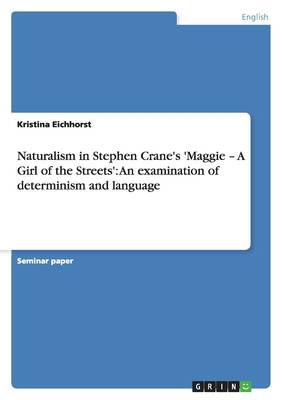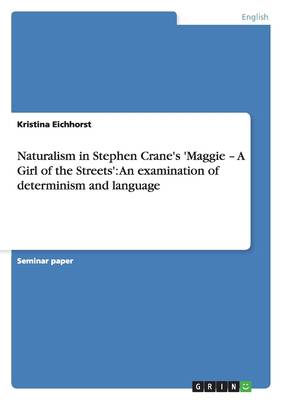
- Afhalen na 1 uur in een winkel met voorraad
- Gratis thuislevering in België vanaf € 30
- Ruim aanbod met 7 miljoen producten
- Afhalen na 1 uur in een winkel met voorraad
- Gratis thuislevering in België vanaf € 30
- Ruim aanbod met 7 miljoen producten
Zoeken
Naturalism in Stephen Crane's 'Maggie - A Girl of the Streets'
An examination of determinism and language
Kristina Eichhorst
Paperback | Engels
€ 23,45
+ 46 punten
Omschrijving
Seminar paper from the year 2011 in the subject English Language and Literature Studies - Literature, grade: 2,0, Ernst Moritz Arndt University of Greifswald, language: English, abstract: When Mark Twain published his Adventures of Huckleberry Finn in 1884, it was seen as the most important representative of a new literary movement: the realistic literature. Though not everyone thought of the novel as a "masterpiece" from the beginning on, it became more popular and significant in the following decades. Ernest Hemingway even called it "the one book that all modern American literature comes from" (Bloom 2004:2). Taken at face value, this statement implies that also Stephen Crane's Maggie - A Girl of the Streets has been influenced by Twain's writing. Since both authors belong to the same period in American literature they naturally adopted literary styles, topics and devices that were typical for that era. Though both novels belong to the realistic period they vary in certain aspects. Unique to Crane's novel are the use of language and the determinism that accompanies the story. These aspects are the central subjects of this paper. It states that language, the characters and the aspect of determinism make Maggie a rather naturalistic than realistic novel. To understand the difference between both terms a review gives the characteristics of realism and separates naturalism as an independent literary form. The two main aspects that make Maggie a naturalistic novel are being examined separately afterwards. Here, the novel itself shall be the main source. At first, determinism is detected in the novel and it shall explain how the characters' fate is shaped throughout the story. Afterwards, aspects of naturalistic language and animal metaphors are examined. The conclusion gives a brief summary of the findings and offers further considerations on the topic and the novel.
Specificaties
Betrokkenen
- Auteur(s):
- Uitgeverij:
Inhoud
- Aantal bladzijden:
- 28
- Taal:
- Engels
Eigenschappen
- Productcode (EAN):
- 9783656122890
- Verschijningsdatum:
- 9/02/2012
- Uitvoering:
- Paperback
- Formaat:
- Trade paperback (VS)
- Afmetingen:
- 178 mm x 254 mm
- Gewicht:
- 68 g

Alleen bij Standaard Boekhandel
+ 46 punten op je klantenkaart van Standaard Boekhandel
Beoordelingen
We publiceren alleen reviews die voldoen aan de voorwaarden voor reviews. Bekijk onze voorwaarden voor reviews.








